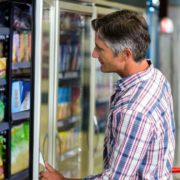The quest for reducing the environmental impact of the F&B sector
The Food and Beverage (F&B) sector encompasses all businesses producing, processing, distributing, and selling food and drinks. This includes restaurants, cafes, bars, catering services, food manufacturers, beverage companies, and grocery stores selling prepared foods and drinks.
So, you can see why this sector is the country’s most significant manufacturing sector by turnover, valued at £104.4 billion—more than the automotive and aerospace industries combined, according to Great.Gov.UK.
The F&B sector is huge—well, it does sustain the world—so it should come as no surprise that it comes with a significant environmental cost. As the global population grows, the demand for food and drink increases, placing even more pressure on the planet’s resources. In this article, we examine this huge industry’s global environmental footprint and explore changes that could be made to create a more sustainable future.
Creating a more sustainable future
Producing food begins with agriculture, which consumes significant energy. Energy is used for planting, irrigating, fertilising, and harvesting crops. Fuel is needed to power tractors and machinery and manufacture and transport fertilisers and pesticides.
Energy in agriculture and primary production
Changes in dietary patterns will also increase demand for energy-intensive crops like rice, corn, and soybeans.
Energy in food processing
The food processing stage is another energy-intensive part of the F&B industry. Factories use electricity and gas to run production lines, cool and refrigerate products, and heat raw ingredients. Some products, such as meat or packaged beverages, require substantial energy in the cooking, pasteurisation, or fermentation processes. Furthermore, many processed foods require energy-intensive packaging, which often involves plastics and metals, which add to the environmental burden.
Transportation and distribution
Once food and beverages are processed, they must be transported to various retail outlets or distribution points. The energy required for transportation—especially when shipping products across long distances—contributes heavily to the food industry’s carbon footprint. Fossil fuel-powered vehicles such as trucks, ships, and aeroplanes are the primary means of transporting food, resulting in high carbon emissions.
Retail and consumption
The final stages of the food system— food retail and consumption—also involve considerable energy usage. Supermarkets and other retail outlets use large amounts of energy for refrigeration, lighting, heating, and air conditioning. In addition, food waste generated at the retail level is a significant issue. A considerable amount of food is discarded due to improper storage, expiration, or cosmetic standards, which wastes the energy used in production and transportation.
The Global Footprint: Environmental Impact Beyond Energy
“Food systems account for over one-third of global greenhouse gas emissions” Source FAO.
Each stage of the food chain requires substantial amounts of energy. According to the Food and Agriculture Organisation (FAO), food systems contribute around 31% of global energy use and are responsible for many greenhouse gas emissions.
Sustainable solutions for a greener food and beverage industry
The PWC has written an article entitled Unlocking the Energy Demand Opportunity in Food and Beverage, which includes suggestions on how F&B companies can cut costs and create value by optimising demand and becoming energy independent.
Other potential strategies to reduce the industry’s environmental footprint include:
Reducing food waste
Better inventory management, improved food storage systems, and smarter consumption habits could prevent unnecessary food waste. Additionally, food waste can be repurposed for composting, bioenergy production, or donated to help reduce hunger.
Adopting sustainable agriculture
Sustainable farming practices can lower energy use and minimise environmental impacts. These include precision farming (which uses technology to optimise resource use), reduced chemical inputs (organic farming), and crop rotation to improve soil health and reduce dependency on synthetic fertilisers.
Plant-based diets
One of the most effective ways of reducing the food system’s environmental footprint is to encourage plant-based diets, which typically require less energy, land, and water than animal products. The growing popularity of plant-based alternatives like Beyond Meat and Impossible Foods is a testament to this shift.
Eco-friendly packaging
Eco-friendly packaging such as biodegradable, recyclable, or reusable packaging can significantly reduce the environmental burden. Reducing the overall use of packaging materials is also an effective strategy to reduce waste.
Conclusion: Working towards a sustainable future
The food and beverage industry certainly plays a pivotal role in sustaining human life but at a considerable cost to the environment. The good news is that consumer awareness is growing.
If we continue to embrace energy-efficient technologies*, reduce food waste, adopt sustainable agricultural practices, and encourage plant-based diets, we can mitigate the environmental impact of the food and beverage industry.
*Footnote: In a world increasingly dominated by rising energy prices and climate change, Emissis is proud to support some leading UK businesses on their journey towards net zero, saving them millions in energy overspending and waste. Get in touch to learn how Emissis has helped several F&B Companies on their net zero journey.
Further reading: Climate Change: And The Food Industry





